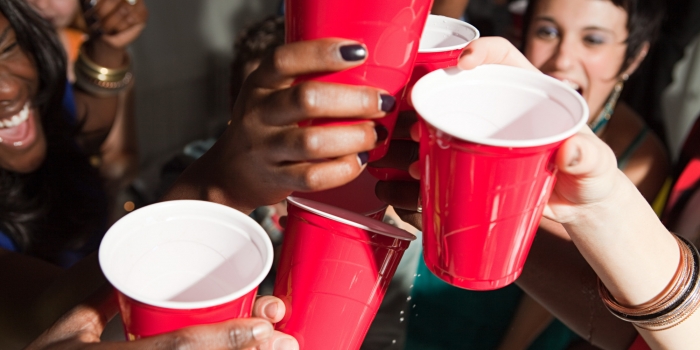In a weird, grown-up way, getting drunk can make us feel like little kids again, with not a care in the world and a lower capacity of physical functioning. The term ‘binge drinking culture’ is thrown around a lot at in a university setting. The definition of binge drinking is the heavy consumption of alcohol over a short period of time with the primary intention of becoming intoxicated. For men, this means consuming five or more drinks, for women it’s consuming four or more drinks within two hours. This definition might provoke any non-sober McGill student to feel a weird mix of recognition, embarrassment, and, finally, reclamation. Drinking to be drunk is what adolescence is all about! If not now, then when? At the same time, the semi-shame still lingers; something that can be considered pathological is an ingrained part of our lives.
Much of McGill’s social culture revolves around heavy drinking. Events like Frosh, power hours, Science Games, Faculty Olympics, Carnival, and E-week all celebrate the combination of a roomful of young, stressed-out people trying to let loose and a flowing supply of booze. In a highly demanding academic setting, excessive drinking can feel like the only leisure activity by which to utterly unwind; however, decentralizing drinking from campus life is not only achievable, it can be really fun.
A good start is acknowledging that none of us have a very solid defence for binge drinking, other than a classic, ‘We’re all going to die eventually anyway!’ Everyone understands its negative consequences. Much of the motivation for binge drinking is that it breaks down inhibition. Stress alleviation is only the beginning; other side effects include confidence, social ease, increased chances of romance and a few warm, pleasant hours of forgetting your middle name. In addition to this, many first-years who come to McGill embrace the low drinking age and lack of parental supervision. What’s more, peer pressure doesn’t exist like it does in after-school specials: Binge drinking culture isn’t forced on us, it’s implicitly learned. When you see people you like having fun while drinking, you want to emulate it. Still, there remains something sad about your most treasured memories coming from moments that are really hard to remember.
The solution doesn’t have to be cutting these events, or drinking in general, out of a student’s life entirely. Escaping ‘binge drinking culture’ can simply mean engaging in leisure activities that don’t consistently put drinking front and centre. A university setting has a lot to offer other than stress and liquor—there are so many workshops, non-academic conferences, and activity-based clubs that all come with peers who have the ideas and energy to make things happen. Decentralizing drinking from student life can also happen on a more personal level. It’s surprisingly refreshing to make a little movie with your friends or form a cover band, play cards, walk up the mountain, or cook together. It’s easy for the big events to become the only time spent socializing. When these events are almost always located in a bar, club, and/or frat house, one can believe that heavy drinking and ‘important occasion’ go hand in hand.
Breaking down binge drinking culture becomes possible when you realize that a disconcertingly high blood alcohol content isn’t what makes you interesting. If you really want to feel like a kid again—even just for a little while—remember the activities you used to engage in, before drinking was ever a part of your life. Try emulating the imagination of an eight year old with free time, friends, and limited expertise, and, chances are, that’s when things will get really interesting.










This is an excellent article.
There is a profound insight contained in the final paragraph. Life as a child is full of wonder, full of fascination and curiosity, and then adolescence makes us too cool for school, then early adulthood passes in a haze of alcohol fumes until graduation from university and… then… um… right. Job. Partner. Thirty. Career. House. Forty. Like a skipping stone we hurtle onward, and if we have the presence of mind and wisdom to look back far enough, we might catch a glimpse of our still-fascinating childhood once again.
Think about it. How many of the answers to the questions of our childhood have been answered? Where does that curiosity go? There are more unanswered questions as we get older, not fewer. How many people trudge along through life, never regaining that fascination, never sparking that childhood kindling into a blaze of life-long passion?
Alcohol acts to tamp down that flame. That’s okay when you’re in university and not quite sure where you’re headed. Kill time, make friends, have a blast. Be aware of the fleeting nature of that respite, though, and stay conscious of the need to emerge from it when you’ve found your passion, and ultimately abandon boozing as an escape.
There’s no escape in the bottom of a bottle.
It’s one of those lessons that is usually learned the hard way.
Thank you for this thought-provoking piece.